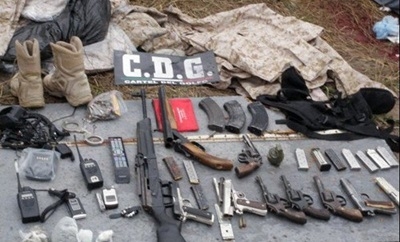According to Mexico’s Attorney General’s Office, there are nine major criminal cartels working with some 43 gangs in the country, further indication of just how much Mexican organized crime has fractured, as well as the degree to which the cartels are leaning on smaller gangs to act as muscle.
Newspaper Excelsior reported that it had obtained this data from the Attorney General’s Office via a freedom of information law request.
According to the Attorney General’s Office, only the Knights Templar and the Jalisco Cartel – New Generation (CJNG) are not affiliated with smaller criminal groups. The other seven cartels identified — the “Pacific” Cartel (a term that refers to the Sinaloa Cartel), the Gulf Cartel, the Zetas, the Beltran-Leyva Organization (BLO), the Carrillo Fuentes organization (also known as the Juarez Cartel), the Arrellano Felix organization (the Tijuana Cartel) and the Familia Michoacana — depend on a plethora of smaller gangs.
Of these, the Gulf Cartel is the most reliant on outsourcing work to smaller groups — they work with 12 gangs, mostly in Tamaulipas state. In second place are the Zetas, who work with nine groups, followed by the Sinaloa Cartel with eight affiliates, then the BLO with six, as indicated in the chart below.
InSight Crime Analysis
The information from the Attorney General’s Office reinforces what many analysts have already observed: Mexico’s large criminal organizations have fractured significantly since former President Felipe Calderon initiated his assault against organized crime in 2006.
This tendency towards fragmentation isn’t exclusive to Mexico. Colombia has experienced a similar phenomenon: once mighty criminal structures like the Rastrojos have imploded, allowing small-scale groups to proliferate. As in Mexico, Colombia’s criminal organizations have become dependent on subcontracting out work to these smaller groups. Even the Urabeños — the only Colombian narco-paramilitary organization that still has a national reach — uses smaller criminal structures known as “oficinas de cobro” to carry out key services (such as assassinations and moving or storing drugs) on their behalf. The dynamic appears to be very similiar in Mexico, with organizations like the Zetas using gangs like “Sangre Zeta” and “Comando Zetas” to act as subcontracted labor.
SEE ALSO: Zetas News and Profile
This is a transnational phenomenon as well, with larger criminal organizations subcontracting cells to act as their “muscle” in other countries. The Texas-born prison gang Barrio Azteca, for example, has acted as an enforcer for the Juarez Cartel. In another case, Mexican mafia group La M acted as the Familia Michoacana’s footsoldiers within the US, protecting methamphetamine shipments, among other duties.

